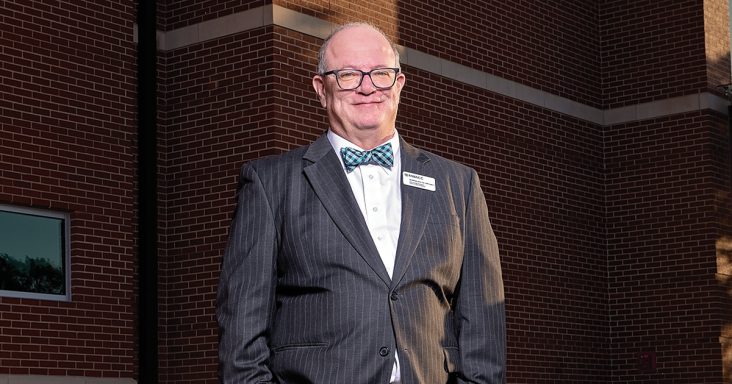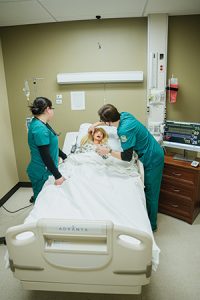NWACC helps health care providers meet labor needs
by November 8, 2024 2:14 pm 310 views

Mark Wallenmeyer, dean of health professions at Bentonville-based NorthWest Arkansas Community College
NorthWest Arkansas Community College is expanding its health care training programs to meet area demand for health care professionals. NWACC recently added a phlebotomy program and will start three more health care programs next year, including practical nursing.
Mark Wallenmeyer, dean of health professions at Bentonville-based NorthWest Arkansas Community College, said the new programs were created based on industry needs.
“Along with the Northwest Arkansas Council and Heartland Whole Health Institute, we have identified the top 25 needs in Northwest Arkansas, as far as health care goes,” Wallenmeyer said. “And those top 25, we’re looking at possibly what can we do; what can’t we do.” He said NWACC currently provides training for 13 of the top 25 programs, and the new programs are among the top 25.
In May, NWACC received a $2.11 million state grant as part of the Arkansas Linking Industry to Grow Nurses (ALIGN) to support and expand the college’s nursing programs, including the new practical nursing program. Wallenmeyer said the grant money would go toward equipment, new practical nursing faculty and clinical instructor costs. He said those who graduate from NWACC’s new programs “should be able to get a job right away.”
According to a recent jobs report provided by Joe Rollins, director of workforce development at Northwest Arkansas Council, the Northwest Arkansas metro had 310 active job ads for licensed practical and licensed vocational nurses over the past six months. The median wage is $49,700.
As of July 1, Wallenmeyer said there were 170 practical nursing and 30 phlebotomy job openings in the area. A phlebotomist is a medical professional who’s trained to perform blood draws on children and adults.
In January, NWACC started offering phlebotomy classes. Wallenmeyer said this was the first time the college provided phlebotomy classes on campus. This spring, 26 students took the national board exam, and 96% passed. Wallenmeyer said he co-taught the spring course, and in July, one of his students was working at the clinic where he had some blood drawn.
“It’s real exciting to see when they actually get out in the field,” said Wallenmeyer, adding that those who complete the one-semester courses like phlebotomy can ensure they want to enter health care and other related programs. “I have one of my phlebotomy students from the spring who is now in the respiratory therapy program.”

PRACTICAL NURSING
NWACC has worked with the Arkansas Office of Skills Development to establish a practical nursing program for high school and college students. NWACC’s Secondary Career Center allows high school students to complete the program.
At its end, students can take the state board exams to earn their license. He said the license is accepted in any compact nursing state, including Arkansas. Wallenmeyer said NWACC’s practical nursing program will start in January with 16 students.
“We don’t want to go too gung ho at the beginning,” he said. “We want to make sure that we have a small cohort so that we get the curriculum right, we get the instruction right and we get off on a good footing.”
The program, which is completed in 12 months, will be taught by five new full-time and five new adjunct faculty members.
“The curriculum has already been developed,” he said. “We are converting a classroom over for it now. And we’re building another small clinical lab here in our building. So, we’re doing quite a bit of work on that one.”
The practical nursing program is also offered at Don Tyson School of Innovation in Springdale, part of NWACC’s Secondary Career Center. The program will be completed over two school years there. He said any high school student in Northwest Arkansas can attend the program if they have transportation to make the classes.
INDUSTRY PARTNERS
Wallenmeyer said NWACC’s new programs were developed after contacting area health care companies about their labor needs. NWACC sends surveys to the companies to determine their needs, as the Arkansas Department of Higher Education requires.
“We look at that as, ‘How can we help the industry?” he said. “They come to us and ask, ‘Hey, can you start a practical nursing (program)?” He added that the request must come from multiple companies to ensure area needs are met.
With the demand in place, NWACC will start creating a program with the Department of Higher Education. He said the process is time-consuming and includes multiple steps.
“Anything that requires a degree, such as a certificate of proficiency, technical certificate or an associate degree, those are a little bit more time-consuming than, say, phlebotomy or medical assisting, which are simply a course that we can offer here at the college, and at the end of that course, the student is eligible to sit for the certifying board,” he said. “Any of these programs that we look at, we make sure that they are eligible to sit for either the state or national certification boards.”
Shelly Cordum, chief nursing officer at Northwest Medical Center – Springdale, said Northwest Health started working with NWACC to support its efforts to receive the ALIGN grant. Applicants were required to work with at least one health care provider to contribute toward the grant, which ALIGN then matched with two-to-one grant dollars.
“This fall, we have 40 NWACC students on our campus while our frontline tenured nurses provide their many years of clinical experience to help these students achieve their nursing degree goal,” Cordum said. “And our nurses are also actively engaged in being part of the solution to solve the national nursing shortage.”
According to the American Association of Colleges of Nursing, the median age of registered nurses is 46. Cordum said tenured nurses are advancing in age, and not enough young nurses are graduating from nursing programs in the state.
“By increasing clinical experiences and utilizing our team’s skills, knowledge, and expertise, we’re expediting the onboarding process for individuals entering our nursing programs,” Cordum said. “Our goal is not just to facilitate their entry but to provide comprehensive support that guides them through to graduation and ultimately secures their immediate employment upon completion of the program.”
Jacqueline Truesdale, chief nursing officer for Mercy Hospital Northwest Arkansas, said Mercy partnered with NWACC and Don Tyson School of Innovation to launch clinical student rotations in spring 2025.
This allows Mercy nurses to serve as clinical instructors, “enhancing not only their clinical skills but also providing invaluable real-world experience for students in the associate degree nursing and practical nurse to registered nurse programs,” Truesdale said. “Our involvement is designed to support student development while also ensuring that the nurses we’re training are well-prepared to meet the complex demands of modern health care.”
She said the program also “strengthens the pipeline of nursing professionals coming into the workforce at a time when they are critically needed.” Truesdale added that the need for skilled nurses has continued to rise amid rapid population growth in Northwest Arkansas.
Lisa Lightner, vice president of human resources at Washington Regional, said it’s partnered with NWACC to help grow the number of nurses and other health care professionals in Northwest Arkansas.
“The more health care systems can support our local programs to increase student capacity and clinical rotation placements, the better prepared our future nurses will be to care for our area’s diverse patient population,” she said. “Washington Regional has committed resources to increase student placements, including those enrolled in NWACC’s LPN program, and used feedback from students to reshape our clinical rotation experience. Washington Regional has also developed in-person, skill-based orientation for all students to better prepare them for their clinical rotations.”
ADDITIONAL PROGRAMS
NWACC has two more programs, medical assisting and pharmacy tech, which are expected to be offered in fall 2025. Wallenmeyer said as of July 1, there were 64 job openings for medical assisting and 37 for pharmacy tech.
Like the phlebotomy program, both will be one-semester programs and will not require prerequisites. The practical nursing program requires three prerequisites: anatomy and physiology, math, and medical terminology. Wallenmeyer noted that NWACC’s registered nursing program requires 33 credit hours of prerequisites.
The practical nursing program costs between $8,000 and $14,000, depending on where the student lives. The one-semester programs are based on credits. The phlebotomy course is $381 plus $225 in fees. The cost for the programs starting next fall has yet to be set.
As part of its work to meet the demand for some of the other top 25 health care jobs, NWACC is considering offering associate degree programs in radiologic technology, diagnostic medical stenographer, medical resonance imaging tech and cardiovascular tech. It’s also considering providing training for medical laboratory technicians. Wallenmeyer said the plan was to offer it next fall, but it may be after that as the college seeks funding for the program.
He said the cost of creating the practical nursing program was “minimal” because the college already has a registered nursing program. The cost included curriculum development and a small renovation project. The other new programs will require small investments, mostly for supplies. He said industry partners often donate supplies, and the students pay lab fees, covering supplies and their exam and study materials.
